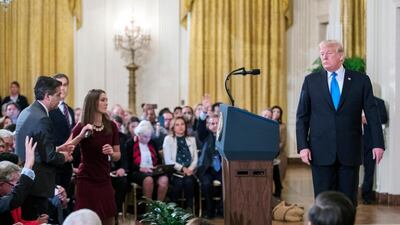Anyone hoping that the outcome of this week's midterm elections might lead to profound changes in the Trump administration's approach to its foreign policy goals is likely to be sorely disappointed.
This will be particularly true in Tehran where, following the imposition of the latest US sanctions earlier this week, the regime will be looking for any potential chink in Donald Trump's political armour that might suggest a weakening in the president's standing.
The Iranians, together with some nations in the Middle East and elsewhere, who are not enamoured of Mr Trump's unique leadership style, will certainly have taken some initial comfort from the result, with the Democrats winning a majority in the House of Representatives.
The anti-Trump lobby in parts of the media have seized on this modest achievement to claim that this is the beginning of the end for the Trump presidency and that the Democrats have taken an important first step towards ejecting the maverick Republican leader from the White House.
But this attitude has more to do wishful thinking than having any relevance to how the result of the midterms will impact the way the president conducts business.
On the contrary, as demonstrated by Mr Trump's peremptory dismissal of Jeff Sessions, his troublesome attorney general, immediately after the results had been declared, the president appears reinvigorated by the result and seems even more determined to press ahead with his radical policy agenda.
For the unpalatable truth the Democrats and their supporters must accept is that their so-called "blue wave" of support failed to materialise and that, apart from picking up a few seats in the House of Representatives, the junior chamber in Congress, they lost badly to the Republicans in the Senate, who have increased their majority, consolidating Mr Trump's authority as president.
It is the Senate, not the House, that has the greater ability to thwart the president’s will, particularly with regard to scrutinising cabinet and other appointments, such as the Supreme Court, as well as major policy issues, including foreign policy.
It was for this reason that Mr Trump concentrated all his formidable campaigning attributes on supporting candidates for the Senate rather than the House, a tactic that was handsomely rewarded and now makes Mr Trump the odds-on favourite to win the 2020 presidential election contest.
The Democrats will – or so it is widely anticipated – use their platform in the House to wage guerrilla war against the Trump presidency, hitting the White House with affidavits on issues ranging from his colourful private life to allegations concerning his alleged links to Russia.
But such attacks are nothing new for Mr Trump. He has been under attack from his critics on the left since the day he took office and the president has been remarkably impervious to their accusations, whether they concern his alleged dalliance with porn star Stormy Daniels or his dealings with Russia.
To pursue such an agenda is not without risk for the Democrats. The midterm results show that the majority of Americans are more concerned with the state of the economy than hand-wringing over Mr Trump’s alleged misdemeanours, and launching a muck-raking campaign against the White House could badly backfire on their own future electoral prospects.
Furthermore, while the House might be able to initiate proceedings with affidavits – including the ultimate sanction of impeachment – the final say on whether they are upheld rests with the Senate, which, now that is has a proper working Republican majority, is unlikely to sanction the public pillorying of a Republican occupant of the White House.
Mr Trump, therefore, far from being inconvenienced by the midterm results, now finds himself in a position to consolidate his legacy, both in terms of his domestic agenda and his key foreign policy goals. So far as the Middle East is concerned, these will be maintaining the pressure on Iran, containing the threat posed by Islamist groups such as ISIS and the Muslim Brotherhood, and pressing ahead with his ambitious plan to achieve a breakthrough in the dispute over Palestinian occupied territories.
The ability of the Democrats to mount a significant challenge to Mr Trump’s approach to any of these issues from their lowly position in the House is limited, to say the least.
For a start, under the constitution, the president has executive authority to conduct foreign policy without constant recourse to Congress.
It is only when legislation is required, as in the case of the Iranian sanctions, that the White House looks for congressional support. And if that is not forthcoming, the president can always fall back on executive orders, an effective device that his predecessor Barack Obama used frequently and effectively to circumvent congressional opposition.
Moreover, on a practical level, most of the administration’s key policies with regard to the Middle East have already been implemented. The new sanctions regime against Iran, including the provision to take punitive action against any foreign company that continues to do business with Tehran, is already in place, as is the controversial decision to move the American embassy in Israel from Tel Aviv to Jerusalem.
The military campaign against ISIS is all but complete. Key issues that still require the president’s attention in the region concern the future of a post-conflict Syria and attempts to negotiate a ceasefire in Yemen but neither of those require any input from Congress.
Thus, rather than seeking to antagonise the White House, the smart approach for countries like Iran who find themselves in Mr Trump’s line of fire would be to try to repair relations with a president who, in all probability, now looks set to occupy the Oval Office until the end of 2024.
Con Coughlin is the Daily Telegraph’s defence and foreign affairs editor


